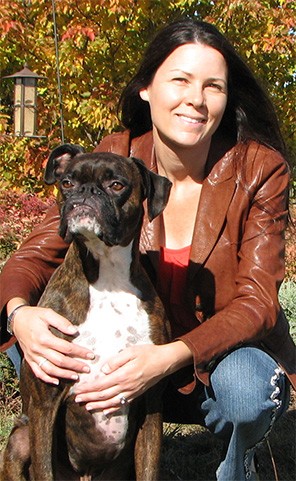How animals can heal you
Professor to give lecture on how animals can help us live better

Dr. Colleen Anne Dell and her dog Subbie.
Kelly Russell suffers from post-traumatic stress disorder (PTSD) from her time with the Canadian Armed Forces. She has nightmares and flashbacks so vivid that she often loses touch with reality and thinks she’s back on the battlefield. But when the trauma starts to affect her, her therapy dog Spot will run up, lick her face and make Russell feel better.
Russell describes one instance when Spot helped her. “I’d had a bad night that night, a lot of bad dreams, a lot of flashbacks. I was in the bathroom, hunkered down, (Spot was) leaning against me, and I’m like, ‘what the hell is this?’” she says.
“But I knew where I was, which was a good thing. I knew I was at my sister-in-law’s, which was remarkable, and I knew who (Spot) was. So we went back to bed, and that was it.”
Ever since then, Russell has grown to love and appreciate Spot, who now helps her leave the house. Russell says she has benefitted from an animal-assisted intervention, a technique where animals are used to help people overcome anything from addictions to mental health issues.
Dr. Colleen Anne Dell, a professor at the University of Saskatchewan, is hosting a presentation at the University of Winnipeg (U of W) on how animals can be used to treat a wide variety of disorders. Dell says one of the main goals of her lecture is changing how we see our pets.
“Around 65 per cent of people have a pet in North America. Out of those, 75 per cent consider that pet a member of their family. But if we do any addictions counselling, or even (during) intake assessment, nobody asks about pets,” Dell says.
“Having a companion animal could be a really important point of support for somebody, but (mental health support systems) ignore it,”
Dell says the most common type of animal-assisted intervention people know about are therapy dogs, like Spot. Therapy dogs are trained to respond to certain stimuli and comfort their owner whenever they feel troubled.
In Spot’s case, he is trained to respond to his owner’s ticks and unease with affection. Other people are not supposed to pet a therapy dog while it’s “working,” while it’s out taking care of it’s owner.
Other animals can be used to help people mentally, such as horses and cats, though the way they provide affection is different. And not every dog is suited to be a therapy dog. Certain breeds such as Labrador retrievers, golden retrievers and German shepherds tend to be better suited for the job.
For Russell, Spot has given her a chance to live life again. Her PTSD stopped her from doing a lot of things, but now with Spot, she has the confidence to get out and experience the world.
“My spouse is like, ‘I’ve never seen you (like this),’ she says. “I’ll go to Walmart, I’ll do the grocery shopping, you know? I go out, which is a huge difference from last April, where you couldn’t ask me to stop and pick up milk … Because I can’t wait to take him out ... I’m not afraid because I’ve got him.”
Dr. Colleen Dell’s presentation, titled PAWSitive Support: Animal Assisted Interventions in the Treatment of Addictions, is being held on Nov. 18 from 12:30-1:30 p.m. in room 3L08 at the University of Winnipeg. The talk is free and open to members of the public.
Published in Volume 71, Number 10 of The Uniter (November 10, 2016)






